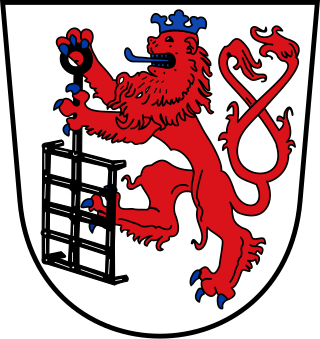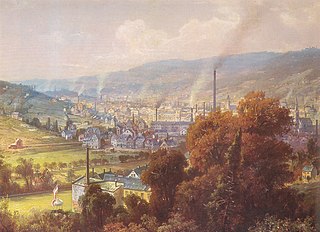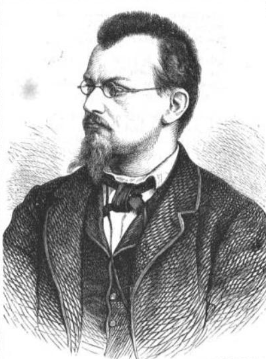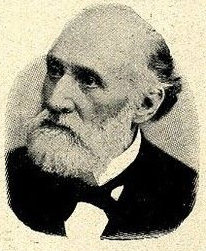
Friedrich Engels was a German philosopher, political theorist, historian, journalist, and revolutionary socialist. He was also a businessman and Karl Marx's lifelong friend and closest collaborator, serving as a leading authority on Marxism.

Wuppertal is a city in North Rhine-Westphalia, Germany, with a population of 355,000. Wuppertal is the seventh-largest city in North Rhine-Westphalia and 17th-largest in Germany. It was founded in 1929 by the merger of Elberfeld, Barmen, Ronsdorf, Cronenberg and Vohwinkel, and was initially "Barmen-Elberfeld" before adopting its present name in 1930. It is the capital and largest city of the Bergisches Land.

Elberfeld is a municipal subdivision of the German city of Wuppertal; it was an independent town until 1929.

Barmen is a former industrial metropolis of the region of Bergisches Land, Germany, which merged with four other towns in 1929 to form the city of Wuppertal.
The General German Workers' Association was a German political party founded on 23 May 1863 in Leipzig, Kingdom of Saxony by Ferdinand Lassalle. It was the first organized mass working-class party in European history.
During the Second World War, the city of Wuppertal suffered numerous Allied air raids, primarily nighttime attacks from the Royal Air Force's Bomber Command during its Battle of the Ruhr bomber offensive. The largest raids were on the night of 29-30 May 1943, heavy enough to cause a firestorm, and on 24-25 June. The wartime-era German Feuerwehr fire brigades were ill-equipped to fight the fires. The RAF's airstrikes destroyed areas of Wuppertal's north-eastern Barmen, central Elberfeld and south-eastern Ronsdorf communities, mainly through incendiary area bombing, resulting in destructive firestorms. Other Allied aircraft also carried out numerous smaller air raids on Wuppertal. Overall, more than 6,500 people lost their lives during World War II in Wuppertal from such raids; 38 percent of the built-up urban area was destroyed.

Willi Baumeister was a German painter, scenic designer, art professor, and typographer. His work was part of the art competitions at the 1928 Summer Olympics and the 1932 Summer Olympics.

Franz Fühmann was a German writer who lived and worked in East Germany. He wrote in a variety of formats, including short stories, essays, screenplays and children's books. Influenced by Nazism in his youth, he later embraced socialism.

Georg Wilhelm Rauchenecker was a German composer, conductor and violinist.

Friedrich Emil Rittershaus was a German poet.

Kemna concentration camp was one of the early Nazi concentration camps, created by the Third Reich to incarcerate their political opponents after the Nazi Party first seized power in 1933. The camp was established in a former factory on the Wupper river in the Kemna neighborhood of the Barmen quarter of Wuppertal. It was run by the SA group in Düsseldorf.
The Baumwollspinnerei Hammerstein was a cotton mill which had accompanying weaving sheds, located in the area now known as Wuppertal, Germany. It was the largest of its type in Bergisches Land and was owned by the Jung family between 1835 and 1869, when it also included a textile school.

August Buchner was a German philologist, poet and literary scholar, an influential professor of poetry and rhetoric at the University of Wittenberg.

The Wuppertal Schwebebahn accident took place on 12 April 1999 on a stretch of track near Robert-Daum-Platz station. The accident, involving car number 4 from the WSW GTW 72 series, killed five people and injured 47, some of them seriously. It remains the worst accident in the railway's history and the only one since the railway opened in 1901 to have had a deadly outcome.

Ewald Grothe is a German historian. Since 2009 he has been an extraordinary professor at the Bergische Universität Wuppertal and since 2011 he has been head of the Archive of Liberalism of the Friedrich Naumann Foundation for Freedom in Gummersbach.
Ernst August Bertram was a German professor of German studies at the University of Cologne, but also a poet and writer who was close to the George-Kreis and the lyricist Stefan George.

Abraham Peter Carl Siebel was a German merchant, poet, and friend of Karl Marx and Friedrich Engels. His pseudonyms were Emil Thilva and Julius Morton.

Johann Friedrich Gerhard Roeber was a German writer and historian who participated in literary circles in Elberfeld and Wuppertal, in Germany.

Adolf Schults was a German poet.
Hugo Alexander Oelbermann was a German poet and bookseller. His pseudonyms were Hugo von Müllenbach, Ernst Thränenlacher, and Nath. Faust.
![An 1859 caricature by Johann Richard Seel [de] that depicts Siebel (top-left), Rittershaus and Carl Michels. Bildniskarikaturen, u. a. Carl Siebel (1836), Emil Rittershaus (1834-1857) und Carl Michels (1831-1866), 1859.png](http://upload.wikimedia.org/wikipedia/commons/thumb/c/ce/Bildniskarikaturen%2C_u._a._Carl_Siebel_%281836%29%2C_Emil_Rittershaus_%281834%E2%80%931857%29_und_Carl_Michels_%281831%E2%80%931866%29%2C_1859.png/220px-Bildniskarikaturen%2C_u._a._Carl_Siebel_%281836%29%2C_Emil_Rittershaus_%281834%E2%80%931857%29_und_Carl_Michels_%281831%E2%80%931866%29%2C_1859.png)














